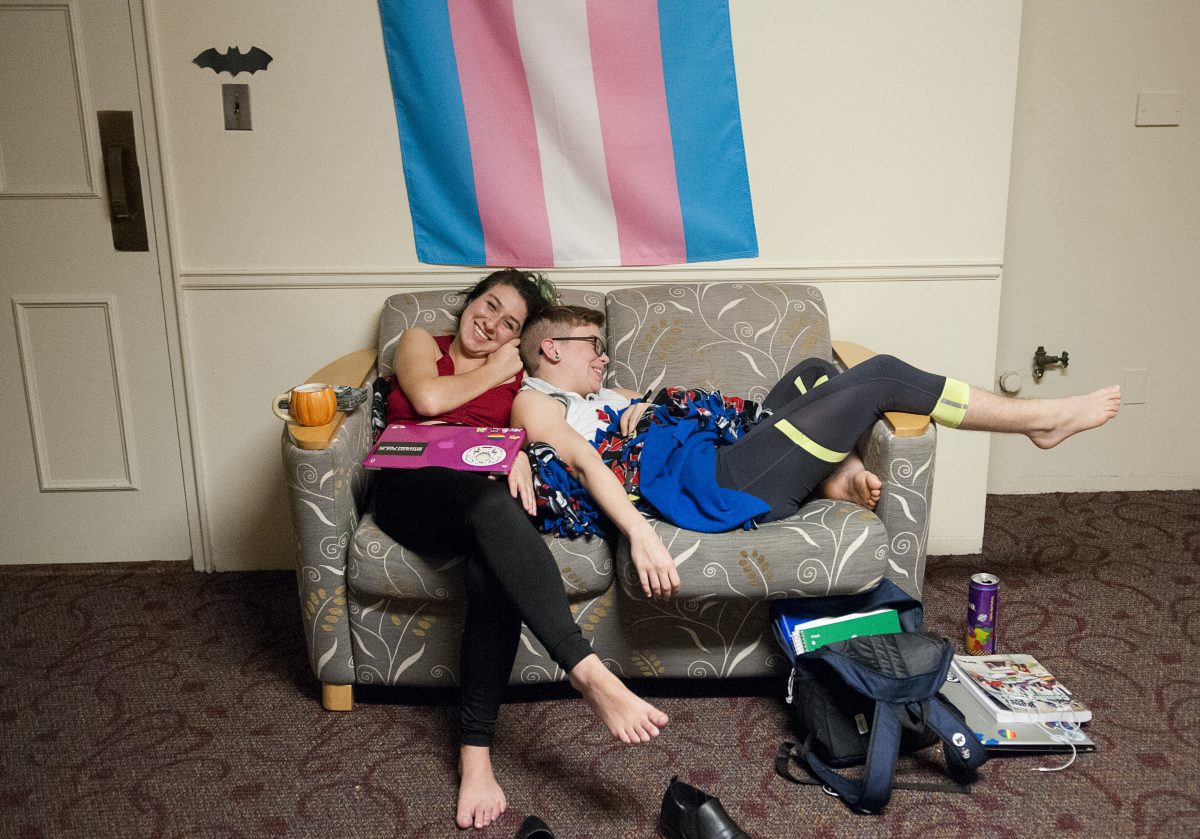
Gender Neutral Housing at Ohio University is Expanding this Fall
By: Michael Kromer, Salgu Wissmath
Posted on:
This Fall Gender Neutral Housing is expanding at Ohio University.
It’s a regular Thursday afternoon for Alex Petras. He lives in a cramped single room in Smith House on the back of South Green. Located about a 15 minute walk from the center of campus, Smith is currently the only dorm at Ohio University offering Gender Neutral Housing, or GNH.
“I chose to live in GNH because I wasn’t sure if I would be able to live in all male housing or least male sections of housing,” Petras said. “And I wouldn’t have been comfortable living in female housing, even I had known the girl I was living with.”
Alex identifies as a trans male and has lived in Gender Neutral Housing for 2 years. Since 2010, GNH has provided students with the opportunity to love in a space that is not gendered. As opposed to a co-ed dorm, Gender Neutral Housing does not segregate the rooms in a hall based on gender identity. This is especially important for people in the LGBTQ community, but specifically for those who identify as trans, non-binary or gender non-conforming.
“If you don’t feel comfortable living in an all men’s or women’s space, for whatever reason” Petras said. “I would say GNH is for you.”
Ohio University is not the only school offering this type of living space. In fact, there are about 265 colleges and universities throughout the United States with gender inclusive housing options. That’s according to campus pride trans policy clearinghouse, a research organization that tracks data about LGBTQ inclusive policies on campuses in the U.S. GNH started at Ohio University because of high demand and wide campus support.
“They did a survey of students and I think it was something like 90% were for it, and 10% may have been against. That’s overwhelming support,” Pete Trentacoste, Executive Director of Housing and Residence Life said about a 2011 study conducted by Ohio University.
For many students like Petras, Gender Neutral Housing was a significant factor in their college decision.
“I got into a couple schools where I probably could have afforded it, but they didn’t have that housing,” Petras said. “I didn’t want to consider that unless I have to. Because I didn’t want to live like that, especially for two years.”
GNH provided Petras with a space he felt comfortable living in. It was such a good experience, he signed up for a second year. Living in GNH allowed Alex to express his identity free of anxiety.
“So even if you feel kind of persecuted or looked at or judged in a lot of other places, at least you’ve got a space where you can go,” Petras said. “And feel as though you don’t have to worry about that for a little bit.”
This Fall, there will be even more spaces like Smith, where gender non-conforming people can live. Five more dorms will offer Gender Neutral Housing options including; Bromley, Sowle, Bryan, Boyd, and Pickering. The expansion will allow for greater convenience and privacy.
“I also think it would add a little bit more anonymity, so if you say I’m in x dorm, that wouldn’t immediately be- is that gnh housing?” Petras said. “They might not have as much of a stigma at first. Some people like to be a little bit more anonymous or quiet about that part of their identity.”
But there are still some concerns, such as how other residents in the building might act.
“I don’t think it would be anything physical or direct but it would probably be more like looks, like ‘hey that makes me uncomfortable’ or like they’re judging us, like we are not super welcome,” Petras said.
While there are still some concerns about how the expansion of GNH will be handled, delfin bautista, self-identified Head Queer of the campus LGBT Center, says it is still a positive change overall because it provides more safe spaces for students to live.
“If person is constantly paranoid about what is gonna happen to them in their residence hall, they are not going to be able to study, they’re not gonna be able to be a whole person,” bautista said.
Bautista went on to say the expansion will benefit the needs of students who want to have a say in who they live with; for example, students with dietary restrictions who need to be closer to specific dining halls like Boyd, or students with mobility restrictions who want to live closer to their classes.
“We are practicing what we preach. We say that we want to create the best student centered living and learning experience and we are doing just that by making sense people can learn, in every sense of the term learn, and now making sure students can live, in every sense of the term live,” bautista said.
GNH is not just for people in the LGBT community. It is also for anyone who wants a say in who they live with, like siblings, relatives, or best friends. Alex recommends the option to folks looking for other forms of housing.
“I would say if you’re a freshman looking for alternative housing, maybe this isn’t the school for you, you’re still looking but still look because a lot of places are adding that kind of housing to their campus and their kind of living experience to be more inclusive,” Petras said. “So it’s definitely out there. Don’t feel too hopeless.”
Salgu Wissmath and Michael Kromer contributed to this story.

